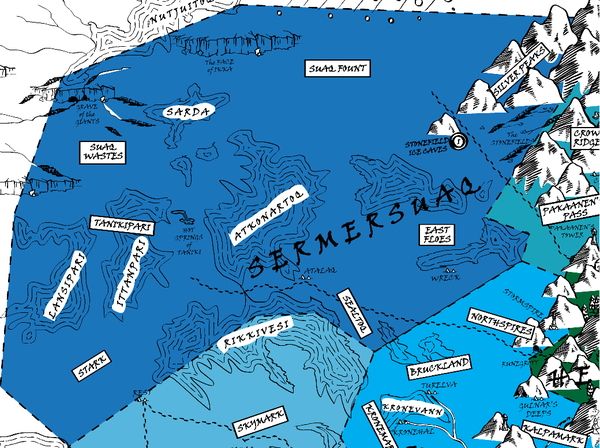Sermersuaq
Overview
Sermersuaq is the ancestral home of the Suaq people. The forests and tundra of this territory are rich with animal life that sustains the Winterfolk, ranging from great furred beasts to small game and hunting birds. The northern waters are home to seals and penguins, and full of fish and whales. As one travels further north, the land becomes colder and colder until a traveller comes to transient ice floes that mark the the farthest extent of the land claimed by the Winterfolk. This fertile territory is under constant threat from both the Thule and the Jotun whose hunting parties also seek to exploit the profusion of life here, regularly engaging in skirmishes with the Winterfolk who live here.
The territory takes its name from the legendary figure of Sermersuaq. Sermersuaq was said to be so powerful that she could balance a kayak on the tips of three fingers, and kill a seal just by rapping it on the head with her knuckles. According to legend, Sermersuaq rode out heavily pregnant from Sydanjaa on a mammoth. She gave birth to one thousand children, half of whom drowned themselves and returned as seals to provide food for the others. Some say Sermersuaq was an Eternal and that all the Suaq share a trace of her bloodline, others argue she is an allegory for the enduring and tenacious spirit of the Winterfolk.
Beyond the ice floes is the wasteland of Tsirku, where the ground is permanently covered in snow. The landscape is far from flat, there are ice plateaus pock-marked with crevasses and areas where the ice is rent apart giving way to cold salty lakes. Here rages the eternal ice-storm Sydanjaa, a roaring blizzard that blows all year round and from whose depths no traveller has ever returned.
Recent History
Following the invasion of Skarsind in 373YE, the intensity of Thule raids actually declined a little as their forces focused on stripping the fallen Wintermark lands. Now that the easternmost of the Winterfolk territories is back in Imperial hands, it is assumed that the frequency of raiding bands coming through the mountains will begin to increase again. By contrast, the Jotun ceasefire has lead to more Jotun raids across the eastern seas, as barbarian warriors denied the opportunity to face Winterfolk in battle have sought other outlets.
Minor Features
Atalaq
Lies on the waters of Atkonartoq, and is gathering and resting place for the scattered hunters who follow the Suaq traditions. It is rich in oils and pelts, a place of cunning and craft, where whale-followers, walrus-herders, Icewalkers and painted hunters return after long treks over the ice.
Wreck
The rib-bones of a gigantic ship of an ancient make jut from the ice here and lie part-submerged under the water. These rib-bones have been covered to make a shelter, and a small settlement has existed around it for as long as anyone can remember.
Rest
The meeting point of two Trods out in the far West, where enterprising souls have erected what must be the furthest wayside inn from any civilisation. The fare is simple, but it’s a welcome sight for far-travelled Navarr.
The Face of Ikka
The face of Ikka, the great glacier, grinds into the water on the borders between Tsirku and Sermerssuaq. The salvage rights to the face of the glacier is a much-prized thing, for – hanging perilously from ropes and using snow-axes – prospectors often find artifacts from the troll nation that’s said to lie under the glacier. Also, from time to time, they find other things – creatures entombed in the ice.
The Grave of the Giants
In Tsirku a great ice-cavern lies by the edge of the waters of Nutjuitoq. The way to it is through a treacherous, shifting maze of icebergs. The cave is where great sea-creatures go to die – whales, kraken and the like struggle up out of the sea from under the ice. No-one knows why. The ivory from this place is plentiful, and particularly prized.
The Hot Springs of Taniki
In the middle of the cold wastes of Sermersuaq, a lagoon filled by hot springs, full of mineral goodness. Bathing in its waters is rumoured to cure any sort of ill.
The Stonefields
A cratered plain covered in fragments of rock. Here there’s a large concentration of weltsilver, amongst other precious metals. But the stonefields regularly attract a force of black, crab-like creatures that appear to be scavenging amongst the rocks.
The Stonefield Ice Caves
The Stonefield Ice Caves is a Bourse position which produces Ilium.
Sydanjaa
The great ice-storm. No one has ever entered and returned to tell what might lie on the other side. Occasionally the Artok are found emerging from the storm, and if not tamed, return again.
Regions
East Floes
Sealtoq
Stark
Suaq Fount
Suaq Wastes
Tanikipari
OOC Notes
- All the regions of Sermersuaq are under Imperial control
Sermersuaq is a fine example of a territory where farms are more likely to represent herds of animals than fields or orchards. A character from Sermersuaq could easily role-play making their money from hunting, rather than more traditional agricultural activities. Diversifying the "farm" to include herbs and measures of rare natural materials could be a good way to support this theme.
The rarest "farmers" in Sermersuaq would be those that follow the mammoth herds, carefully picking off the weakest and oldest members of the herds and selling the meat, hide, hair and ivory produced - only a few mammoths every season would be enough to provide a character with a regular income.
Rituals such as Blessing of New Spring work equally well on herds of deer or sheep and colonies of seals as they do on farms or orchards, but represent a great opportunity to rename and reflavour the performances to reflect their target being animals, rather than plants.
